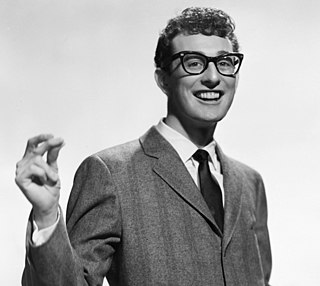
Charles Hardin “Buddy” Holley was an American singer-songwriter who was a central and pioneering figure of mid-1950s rock and roll. He was born in Lubbock, Texas, to a musical family during the Great Depression, and learned to play guitar and sing alongside his siblings. His style was influenced by gospel music, country music, and rhythm and blues acts, which he performed in Lubbock with his friends from high school.

The Crickets were an American rock and roll band from Lubbock, Texas, formed by singer-songwriter Buddy Holly in January 1957. Their first hit record, "That'll Be the Day", released in May 1957, peaked at number three on the Billboard Top 100 chart on September 16th, 1957. The sleeve of their first album, The "Chirping" Crickets, shows the band line-up at the time: Holly on lead vocals and lead guitar, Niki Sullivan on rhythm guitar, Jerry Allison on drums, and Joe B. Mauldin on bass. The Crickets helped set the template for subsequent rock bands, such as the Beatles, with their guitar-bass-drums line-up and the talent to write most of their own material. After Holly's death in 1959 the band continued to tour and record with other band members into the 21st century.

"That'll Be the Day" is a song written by Buddy Holly and Jerry Allison. It was first recorded by Buddy Holly and the Three Tunes in 1956 and was re-recorded in 1957 by Holly and his new band, the Crickets. The 1957 recording achieved widespread success. Holly's producer, Norman Petty, was credited as a co-writer, although he did not contribute to the composition.

"Summertime Blues" is a song co-written and recorded by American rock and rockabilly artist Eddie Cochran. It was written by Cochran and his manager Jerry Capehart. Originally a single B-side, it was released in August 1958 and peaked at number 8 on the Billboard Hot 100 on September 29, 1958 and number 18 on the UK Singles Chart. It has been covered by many artists, including being a number-one hit for country music artist Alan Jackson, and scoring notable hits in versions by Blue Cheer, The Who, and Brian Setzer, the last of whom recorded his version for the 1987 film La Bamba, in which he portrayed Cochran. Jimi Hendrix performed it in concert.

"Not Fade Away" is a song credited to Buddy Holly and Norman Petty and first recorded by Holly and his band, the Crickets.

"Buddy Holly" is a song by American rock band Weezer. The song was written by Rivers Cuomo and released as the second single from the band's debut album Weezer on September 7, 1994, which would have been Buddy Holly's 58th birthday. The lyrics reference the song's 1950s namesake and actress Mary Tyler Moore. It reached number two and number 34 on the US Modern Rock Tracks chart and the US Mainstream Rock Tracks chart, respectively. The song also reached number six in Canada, number 12 in the United Kingdom, number 13 in Iceland and number 14 in Sweden.

Buddy Holly recorded under several names and with several different backing bands. The Crickets played on almost all of his singles in 1957 and 1958.

"Heartbeat" is a rockabilly song credited to Bob Montgomery and Norman Petty and originally recorded by Buddy Holly in 1958. The B-side of the single was "Well... All Right".

"Bo Diddley" is a rhythm and blues and rock and roll song first recorded by Bo Diddley at Universal Recording Corporation in Chicago and released on the Chess Records subsidiary Checker Records in 1955. Written by Diddley, its lyrics are based on the traditional lullaby titled "Hush Little Baby", and it prominently features the Bo Diddley beat that the singer made famous. It became an immediate hit single that stayed on the R&B charts for a total of 18 weeks, 2 of those weeks at #1, and seven more weeks than its flipside. It was the first recording to introduce African rhythms into rock and roll directly by using the patted juba beat. It was Diddley's first recording and his first hit single. The song is featured on many of Diddley's compilation albums including His Best.
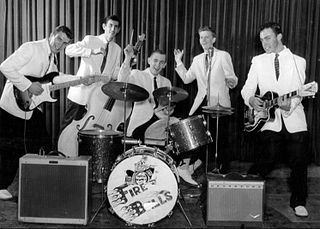
The Fireballs, sometimes billed as Jimmy Gilmer and the Fireballs, were an American rock and roll group, particularly popular at the end of the 1950s and in the early 1960s. The original line-up consisted of George Tomsco, Chuck Tharp (vocals), Stan Lark (bass), Eric Budd (drums), and Dan Trammell.
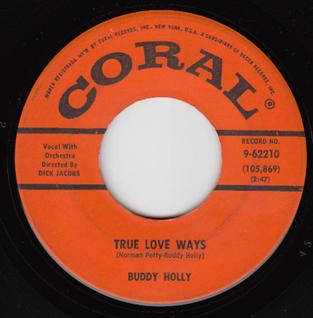
"True Love Ways" is a song attributed to Norman Petty and Buddy Holly. Buddy Holly's original was recorded with the Dick Jacobs Orchestra in October 1958, four months before the singer's death. It was first released on the posthumous album The Buddy Holly Story, Vol. 2, in March 1960. The song was first released as a single in Britain in May 1960, reaching number 25 on the UK Singles Chart. It was released the following month in the US, but did not make the charts. In 1988, a UK re-release of the recording by MCA, the single reached no. 65 on the UK singles chart in a 5 week chart run.

That'll Be The Day is the second and final studio album from Buddy Holly. Decca, Holly’s first major record label, after failing to produce a hit single from Holly’s early recordings, packaged these 1956 tunes after he had some success with recordings from the Brunswick and Coral labels, especially the previously released single "That'll Be the Day". This is the last album released before his death in a plane crash on February 3, 1959, and is rare among collectors.

The Buddy Holly Story is the first posthumously released compilation album by Buddy Holly and the Crickets. The album was released on February 28, 1959 by the Coral Records less than a month after Holly's death.

"Raining in My Heart" is a song recorded by Buddy Holly on October 21, 1958 at the Pythian Temple on West 70th Street in New York City, with the orchestral backing by Dick Jacobs. The music and lyrics are written by the songwriting team of Felice Bryant and Boudleaux Bryant. It was released as a single on Coral Records in 1959, peaking at number 88 on the Billboard chart as the B-side of "It Doesn't Matter Anymore". This recording was included on Buddy Holly's first "greatest hits" compilation album, The Buddy Holly Story, that was released in March 1959.
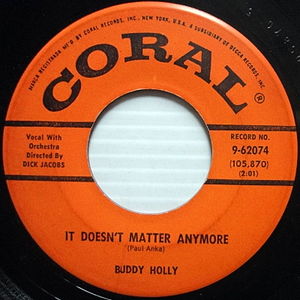
"It Doesn't Matter Anymore" is a pop ballad written by Paul Anka and recorded by Buddy Holly in 1958. The song reached number 13 as a posthumous hit on the Billboard Hot 100 chart in early 1959, shortly after Holly was killed in a plane crash on February 3, 1959. The single was a two-sided hit, backed with "Raining in My Heart". "It Doesn't Matter Anymore" was Holly's last US Top 20 hit and featured the orchestral backing of Dick Jacobs. It was also successful in the United Kingdom, where it became the country's first posthumous number 1 hit.

Reminiscing is a compilation album by American rock and roll icon Buddy Holly. The album was released as an LP record in both mono and stereo formats in February 1963.
Showcase is a compilation album by American rock and roll singer Buddy Holly. The album was released as an LP record in both mono and stereo formats in May 1964.
Holly in the Hills is a compilation album by American rock and roll singer Buddy Holly, including songs featuring Bob Montgomery originally released under "Buddy & Bob". The album was released as an LP record in both mono and stereo formats in January 1965.
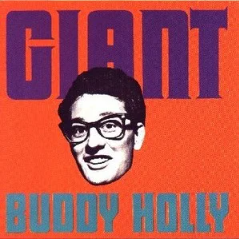
Giant is a compilation album by American rock and roll singer Buddy Holly. The album was released as an LP record in stereo format in January 1969.
















